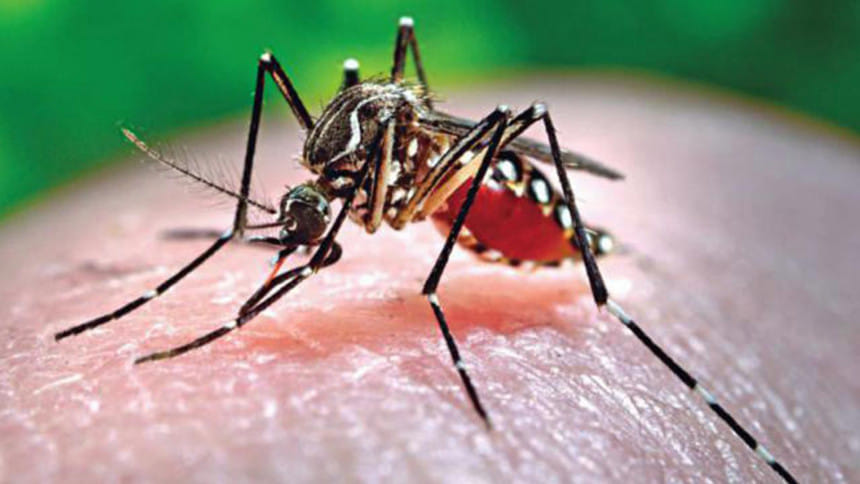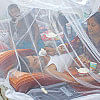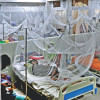Dengue Outbreak in South Asia: Climate change the culprit?

With the capital gripped by panic over dengue, experts said global warm-ing resulting from climate change is a key reason behind the rising num-ber of dengue cases.
They said dengue situation worsened in many South Asian countries due to global warming and that temperature ranging between 27 and 32 degrees Celsius was ideal for Aedes mosquitoes, the carrier of the viral disease, to breed.
Talking to The Daily Star recently, the experts also said Dhaka with its high temperature and humidity coupled with rapid urbanisation and in-termittent rain remained vulnerable to dengue outbreak.
“Climate change is a key reason for the rising prevalence of dengue in Bangladesh. Warmer and humid weather along with irregular rainfall helps Aedes mosquitoes breed and Dhaka is a perfect place for that,” said MM Akhtaruzzaman, manager of the Directorate General of Health Ser-vices’ malaria and dengue programme.
Dr SM Munjurul Hannan Khan, additional secretary of the environment, forest and climate change ministry, said climate change creates a favour-able condition for many vector-borne diseases, including dengue.
“As weather pattern is changing in Bangladesh, the prevalence of vector-borne diseases in increasing. Besides dengue, many such diseases may become more common in the country,” he said.
Several global studies also talked about the link between global warming and dengue.
A study, published in US-based Public Library of Science (PLOS) in May, said global warming places up to 1 billion people worldwide at risk of ex-posure to disease-carrying mosquitoes over the next 50 years.
The two most common disease-transmitting mosquitoes -- Aedes aegypti and Aedes albopictus -- carry viruses such as dengue, Zika and chikungu-nya, plus more than a dozen others that could become larger threats in the next half-century, the study report said.
Another study published in journal Nature Microbiology and reported by The New York Times on June 10 said climate change would exacerbate the spread of dengue fever.
Warming temperatures help expand dengue’s range because as it gets warmer, mosquitoes can thrive in more places where they could not pre-viously.
Warming temperatures also shorten the time it takes a mosquito to be-come a biting adult and accelerate the time between when a mosquito picks up a disease and is able to pass it on, according to the study.
Md Mahfuzul Hoque, professor at Dhaka University’s microbiology de-partment said, “Usually, dengue situation does not remain so acute dur-ing this time of the year. However, the risk increases when temperature rises and weather becomes unpredictable.”
The common symptoms of dengue, a viral disease spread by Aedes mos-quitoes, include fever, severe joint pain and internal bleeding.
In Bangladesh, the number of dengue cases has increased around nine times in the last 10 years. In 2008, there were only 1,153 identified den-gue patients in the country with no causality reported. Last year, the number rose to 10,148 with 26 deaths.
Data from the DGHS show that 9,256 people have been infected with dengue until yesterday this year. And eight people have died of dengue so far.
More specifically, 295 dengue cases were reported in June last year. This year, the number rose to almost five times to 1,753 for the month. For Ju-ly last year the number was 946, whereas a total of 7,513 dengue cases have already been reported until yesterday during this month.
Like Bangladesh, Pakistan, Nepal, Sri Lanka, Maldives, Malaysia, Thailand, Cambodia, Laos, Philippines, Singapore and Vietnam are also experienc-ing increased number of dengue cases, according to the data from Euro-pean Centre for Disease Prevention and Control (ECDC).
As of July 15, Malaysia has reported 69,700 cases, compared to 36,000 cases in the same period last year.
Singapore had 5,620 dengue patients as of June 22 against 1,200 for the same period last year.
In Thailand, the number of dengue cases was 40,402 as of July 2, from 18,100 for the same period last year. The most affected provinces include Trat, Ubon Ratchathani and Samut Sakhon.
Due to the intense circulation of the virus throughout the country, Thai-land has declared a state of emergency and is forecasting approximately 90,000 cases for this year.
According to World Health Organisation, over 2.5 billion people -- over 40 percent of the world’s population -- are now at risk from dengue.
WHO estimates there may be 50–100 million dengue infections worldwide every year and also said the disease is now endemic in more than 100 countries with South-east Asia and the Western Pacific regions are the most seriously affected.
WAY OUT
The DGHS has wrote to Oxford University about Oxitec’s “Friendly Mosqui-toes” that are proven, safe, targeted vector control solution to combat mosquitoes that transmit disease.
“We are yet to get any response. Global experience is that Oxitec’s Friendly Mosquitoes gives result within four to five months. After getting reply from the authorities, we will see whether it is feasible for the coun-try, whether it has any health impact,” Abul Kalam Azad, DG of the DGHS, told The Daily Star yesterday.
Oxitec is a British biotechnology company which develops genetically modified insects to assist in insect control.
According to the company, their “friendly” mosquito strains are designed to significantly reduce the population of a targeted mosquito species in the wild without impact on human or environmental health.
Upon release into the environment, Oxitec’s second generation male-selecting strains mate with females, and only male offspring with a self-limiting gene survive to adulthood.
The surviving non-biting males subsequently seek out and mate with more wild females and pass along the self-limiting trait for up to 10 gen-erations before being extinct, according to Oxitec.
The government is also thinking of introducing Wolbachia in the country to prevent dengue.
Prof Mahmudur Rahman, former director of Institute of Epidemiology, Disease Control and Research (IEDCR), said Wolbachia-infected mosqui-toes could be one of the most effective ways to bring the situation under control.
When an infected female mosquito mates with an uninfected male, they will produce Wolbachia-infected mosquitoes. It is the same when both in-fected mosquitoes mate. But when a Wolbachia-infected male mosquito mates with an uninfected female, the eggs won’t hatch. The bacteria does not pose any danger to humans, he said.
The Nature, a British multidisciplinary scientific journal, in an article on July 17 said two islands in the Chinese city of Guangzhou have reduced the Aedes albopictus, or Asian tiger mosquito, by up to 94 percent using the method.
“We are exploring all the possibilities. We have talked to the World Health Organisation. Probably they will send an entomologist soon to see the situation in the country,” Azad said.

 For all latest news, follow The Daily Star's Google News channel.
For all latest news, follow The Daily Star's Google News channel. 







Comments